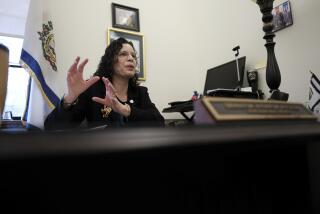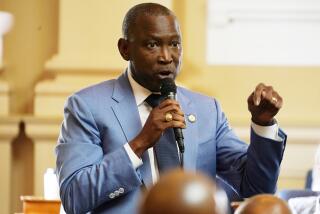Vote May Be Final Blow to Racism in Virginia : New South: The state has come a long way in 20 years. Despite a white majority, many cities have black mayors.
- Share via
RICHMOND, Va. — Looking out over a cheering crowd of black and white supporters, L. Douglas Wilder declared Tuesday night that he had become the nation’s first elected black governor, even though nearly complete returns showed he held only a slender lead.
He made no reference to the historic nature of his strong showing, saying only that the message sent was that “negative campaigns work everywhere but in Virginia.”
Meanwhile, supporters at a hotel ballroom “victory party” here expressed hope that a historic racial barrier had been cleared.
“The day of extreme racism may be over,” Ernest Miller, a black high school teacher from Farmville, declared with a Scotch and water in hand. “This sends a strong message to every state that maybe the time has come when the color of your skin has nothing to do with the performance you can give in an elected position.”
Worth Hicks, a white salesman from Richmond, said, as early returns indicated Wilder’s election: “We are real proud to be the first state in the union to have a black governor. We’re moderate people here. It says we are becoming more responsible and are trying to pick the best qualified man. Virginia has overcome the race issue.”
Although the outcome remained in doubt, it was still remarkable that the 58-year-old lieutenant governor and former state senator had carried the campaign against moderate Republican J. Marshall Coleman to a dead heat in a state with an 85% white electorate.
After all, Virginia was the “Capital of the Confederacy” and the “Home of Massive Resistance” to court-ordered desegregation.
To be sure, the state has come a long way in the last two decades. The Old Dominion has been transformed into the New Dominion, a prosperous, relatively progressive state without strong racial polarization.
In fact, a dozen cities in Virginia have elected black mayors or vice mayors despite a minority of black voters.
“We have been judging candidates by their qualifications, not by their race, in Virginia for years,” said Democratic state Sen. Bobby Scott, a black from Newport News.
Nevertheless, Wilder’s candidacy presented a stunning paradox. He headed a Virginia Democratic Party that embodies the heritage of not just James Madison, James Monroe and Thomas Jefferson but also of Robert E. Lee, “Stonewall” Jackson, Jefferson Davis and those leaders of massive resistance, Harry Byrd Sr. and Mills E. Godwin.
The fact that Wilder was in sight of victory “is phenomenal for a state with an 85% white voting majority and a tradition of discrimination,” Wilder’s media consultant, Frank Greer, declared.
In the 1970s, Wilder was an Afro-haired liberal who barged into the state Senate demanding that the state song, “Carry Me Back to Ole Virginny,” be repealed because it was racist.
Since then, he has moved to the right, particularly on criminal justice issues, and become one of the capital’s savviest pragmatists and coalition-builders.
He has also become wealthy from his law practice and real estate investments; he wears expensive clothes and owns two Mercedes automobiles.
Politically, Wilder embodies the New South, moving into the circle of Democrats casting themselves as fiscal conservatives and social progressives: Virginia Sen. Charles S. Robb, outgoing Gov. Gerald L. Baliles, Sen. Sam Nunn (D-Ga.) and Sen. Albert Gore Jr. (D-Tenn.), among others.
“To a large degree, he is responsible for getting the Virginia Democratic Party past imposing litmus tests on candidates on such issues as right to work, affirmative action, busing and so on,” Scott said. “Doug has helped put together the coalition of labor, conservatives and others that makes for a moderately progressive Democratic Party.”
In his campaign, Wilder steered clear of liberals, even asking the Rev. Jesse Jackson to stay away.
“Jackson is much more of a populist, wanting to redistribute wealth. Wilder has joined the Establishment, which was reassuring to whites,” said Bob Roberts, a political scientist at James Madison University.
Indeed, being able to project himself as an Establishment insider swimming in the political mainstream was a crucial ingredient of Wilder’s strong showing.
“Doug Wilder was the George Bush of this campaign, the heir apparent to eight successful years” under two previous Democratic governors, Robb and Baliles, said Larry Sabato, a University of Virginia political scientist.
“Wilder was the status quo candidate of prosperity and progress,” Sabato continued. “By contrast, Coleman was Mike Dukakis, the guy who had difficulty making the case for change.”
Also working in Wilder’s favor was his personality, a valuable commodity in the television age. Wilder is “affable, charming, very likeable,” Sabato said, whereas Coleman came across as “too ambitious, aggressive, unlikeable.”
And Wilder was able to focus the campaign on the issue of abortion, a powerful symbol that enabled him to keep Coleman on the defensive.
Wilder’s attack on Coleman’s anti-abortion stance was a bold gamble aimed at reviving his faltering campaign. Around Labor Day, Coleman led in the polls and was scoring points with assaults on Wilder’s integrity.
Most of Coleman’s ads pounded on Wilder for being reprimanded by the state Supreme Court for neglecting a client; for failing to take care of a row house haunted by “vagrants and rats,” and for failing to list all of his holdings on financial disclosure forms.
The charges fell short in part because Coleman himself was hurt by ties to land developers, including one who gave $500,000.
Neither candidate emphasized race in the campaign, but it undoubtedly was a factor at the polls.
“All that New Dominion stuff sounds good for the chamber of commerce, but this is still the South,” said state Sen. E. Moody (Sonny) Stallings Jr. “Rednecks had to vote for Doug for him to be elected.”
As it turned out, voters like Darlene Walker, a white mill worker who voted for Wilder, helped him to approach victory.
“This day and time,” she said, “I don’t think you look at people and say they’re black or they’re white. I think it just has to be the most qualified.”
More to Read
Sign up for Essential California
The most important California stories and recommendations in your inbox every morning.
You may occasionally receive promotional content from the Los Angeles Times.










